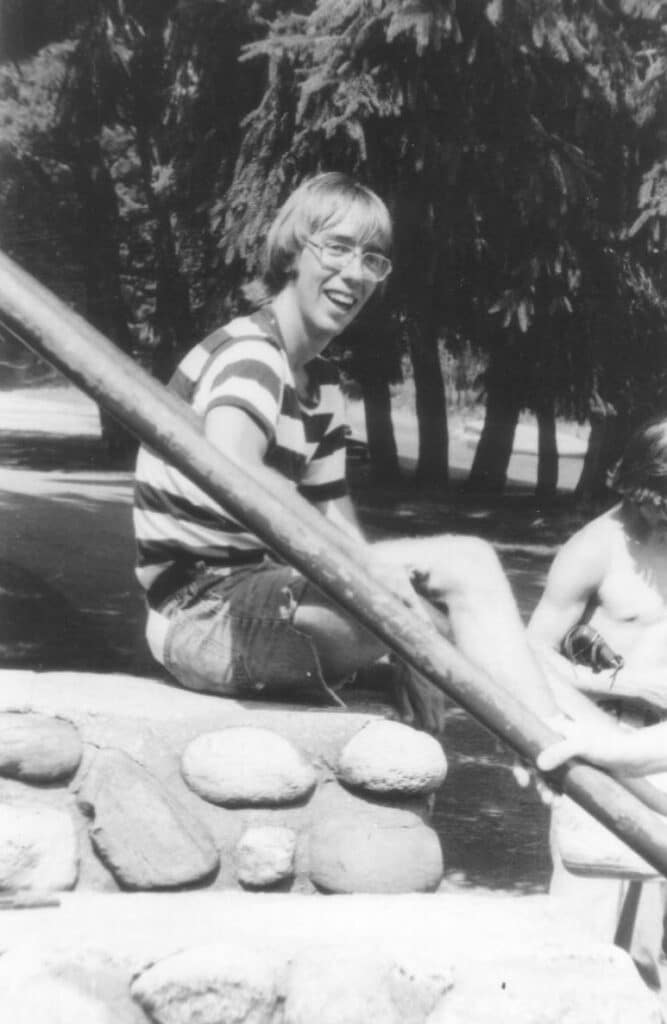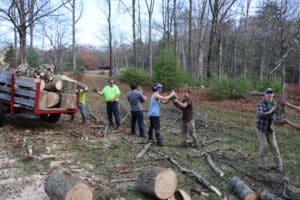Breaking Down Barriers
Lanny Millette first heard about Camp Deerpark through Eastern Mennonite University (then called Eastern Mennonite College), when he took a class called Urban Seminar in 1973. The summer class, held in New York City, was taught by Dale Stoltzfus. Lanny lived with Wes and Marian Newswanger in the Bronx. “Both Wes and Marian were very involved with a relatively new venture called Camp Deerpark,” Lanny said. “They spent as much time as they could up there. I was intrigued by the idea of a camp owned and operated by city churches.” Lanny had no idea then that he would end up at Camp Deerpark the following summer.
Lanny originally planned to work at Camp Hebron for the summer of 1974, where several of his other friends were going to work. He applied and was accepted, as a lifeguard, but the camp accidentally hired too many lifeguards, so they referred Lanny to other camps. One of these camps was Camp Deerpark. Dale offered him a job and Lanny remembers, “I really wanted to go to a camp so I accepted. It was a life-changing decision, and I am sure that God was directing it the whole way.” He was the lifeguard and recreation director for that summer and then ended up at Camp Deerpark for the next six summers, filling in various roles.
One summer, Lanny stayed at camp for the break between camp sessions. Eugene “Biggie” Davis was there as well. The camp directors, Jerry and Leonor Kennell, left to celebrate their anniversary, so Lanny and Biggie were the only ones at camp. “We were sitting on the front porch, sipping coffee and waiting for the deer to come out on the lawn when a bus came driving up the road,” said Lanny. “They pulled into the front of the lodge and told us that they had booked an afternoon picnic, including a supper. After a little shock recovery we jumped into action and began looking through the kitchen to see what we could serve.” Nobody had told them that there were guests coming and the directors had forgotten too, so there wasn’t a lot of food left in the kitchen. In the meantime, Jerry and Leonor had remembered the group was coming, and had quickly returned to camp. Hot dogs were found, and the group had a cookout for supper. Lanny, Biggie, Jerry and Leonor all worked together to get a meal ready. “We tried really hard to not let the group know there was a problem,” Lanny said. “You have to be resourceful and expect the unexpected when you work at camp.
”On another of those break weekends Frank Freeman and Lanny opted to stay behind and clear a fire circle in the lower end of camp below the cemetery. It seemed like an ideal location, secluded and surrounded by natural beauty. It was hard work but they eventually cleared out a nice space in a natural meadow. Frank really enjoyed using the riding mower to cut down the high grass and Lanny worked at trimming out the edges. They pulled logs from the woods for seats and made a fire circle using stones from the creek bed. When it was done they sat down and determined to name this new holy ground. They considered using their initials similar to JCTV (Jose Cruz and Tommy Villanueva) but decided, with a little help from Jane Jacobs (a counselor), to take inspiration from the peaceful atmosphere and call it Shalom. There were two surprises in its early use. The first came that first night when they tested it out. They thought they had built it deep in the woods but then a car drove by on Brandt Road, only 100 feet from where they were sitting. The second came the first night it was used for campers. About 20 minutes into the singing a whole lot of stinging insects started buzzing around the campers. The next day the nest was found and cleared out. From that point on the site lived up to its name: Shalom!
Campfires offered significant holy moments at Camp Deerpark. It was the time at the end of the day when all of camp came together for fellowship and to worship the Lord. No one wanted to miss these special times to sing silly songs like: “When I First Came to this Land,” spirituals like “Wade in the Water” and other worship songs like “King Jesus is All.” Then there was a time of recounting the highlights of the day and a word from the Lord offered by the camp pastor. Sometimes stories were acted out, sometimes they were straight out of Scripture, and sometimes they were stories like one Wes Newswanger once shared. Little Wally (a fictional character) smelled pancakes at a diner during a time of distress, and the pancakes reminded him of Camp Deerpark. He remembered how he learned about the God who would never leave him when he was at camp. “There were many great times at camp,” Lanny said, “but it seems that those evening campfires stood out as special treasures.”
Camp Deerpark provided many life lessons for Lanny and for many of the campers that he worked with. “That first summer,” he said, “I felt that I had to prove myself in many ways because I was a bit different than most of my co-workers. But by the end of the summer we were brothers and sisters with an appreciation for those very differences. I also felt empowered to come back the next summer and serve in a leadership position.”
Lanny remembers mentoring one camper, in particular. “John ‘Junior’ Brock was one of my repeat campers,” said Lanny. “He would often hangout with ‘Lifeguard Lanny’ during the day. We had many deep discussions, and I felt in my heart that God was going to do something powerful with his life. Today he is an anointed pastor in Ohio and a cherished friend on Facebook.”
Lanny thinks that Camp Deerpark makes campers and staff step out of their comfort zones and that this is one of camp’s best qualities. “Camp has a way of breaking down barriers,” he said. “We are all out of our comfort zones on some level. This makes us a little more vulnerable and more open to change. It helps us start the transformation into becoming leaders.”
Lanny’s note: Dottie Nolt Weber would prepare these for us and it went over really well with both campers and staff.
Chinatown Franks
1 green pepper, cut in 1-inch squares
1 medium onion, chopped
¼ cup salad oil
1 pound frankfurters, cut diagonally in 1-inch pieces
2 (8-oz.) cans tomato sauce
¾ cup water
2 tablespoons vinegar
2 tablespoons brown sugar
hot cooked rice
In skillet cook green pepper and onion in salad oil at medium heat until tender. Add frankfurters; brown lightly. Add tomato sauce, water, vinegar, and brown sugar; simmer 20 to 25 minutes, stirring occasionally. Serve over rice. Makes 6 servings.
“It is my prayer that camp will continue to be a place where people can come and experience God in an intimate and powerful way. That young lives will be nurtured into leaders for tomorrow. That camp will continue to provide a safe and supportive place to experience God in a new way.”
—Written by Dillon Hershey and Lanny Millette.
Lanny Millette, former staff member, current board member.
Related Entries
Share:
Come and Pray Lunch & Retreat
Come and PrayPrayer Day with Lunch March 14, 9am-3pm~$30~ Overnight Prayer RetreatMarch 13-14includes March 14 Lunch~$120~ Come seek the Lord’s face with your faith family from all over the Tristate region for a relaxing time of prayer and discussion. We know God is doing amazing things — and he will continue to do more as…
Time to Pray
As followers of Jesus, he is our example in everything. When Camp says in our mission statement that we are “a community of Christ” – this is what we’re saying: we’re a group of people dedicated to the purpose of following and being like Jesus. So the question is, how do we follow Jesus as…
A Place of Prayer
Prayer — especially “vertical prayer” for specific God-revealed mission set apart from the concerns of our life and ministry — is a major theme for Camp in 2026. Maybe you read about this in the Winter Newsletter article “Time to Pray“? We want to extend the invitation to the entire Camp community and beyond —…
Living Abundantly Retreat
Jesus promised his followers an abundant life. Is that just an abstract idea to distract us from earthly misery, or is there real power in Christ to live a full and rich life in the here and now? Young adults are navigating a challenging landscape as they start “adulting” and building a life, so we’ll…
Forgiving Debts: 2025 Woodcutting Season
When Jesus taught his disciples to pray (Mt 6:9-15), he described two big realities where “thy Kingdom Come, thy will be done on Earth as it is in Heaven” are realized in the human world: First, he said “give us this day our daily bread”, acknowledging that God’s provision for human need is a central…
“How Do I Donate?”
Recently, a thirteen-year-old guest at Camp asked Operations Director Kevin Smith, “how do I donate?” Kevin was honestly a little surprised, but was happy to see this young member – who was on retreat with one of our owning churches — taking some initiative. Kevin directed him to the website Donate page, and the young…
The Discipleship Down-Low
Defining Discipleship 18 And Jesus came and said to them, “All authority in heaven and on earth has been given to me. 19 Go therefore and make disciples of all nations, baptizing them in the name of the Father and of the Son and of the Holy Spirit, 20 teaching them to observe all that I have commanded…
The Virtuous Wife
This past weekend, Camp hosted three women’s retreats at Camp. Though the retreat groups were very diverse in background – one was from an urban church plant in Philadelphia, one was from a Garifuna Mennonite church in Brooklyn (an Afro-Caribbean Culture), and one was from a multi-ethnic faith community reaching out in North Jersey. Though…
A Life of Service
I believe the most important thing to God is not our personality, knowledge, or talents, but our availability. How willing and ready are we to respond when He calls, and how ready are we to do what He says? What use to the Lord are people who could do what he wants with excellence and…
Building Belonging
At our February NYC LMC District meeting, we’re discussing the Belonging phase of The Journey Map. In this first phase on the map, individuals and groups on a spiritual journey begin the process of connecting to each other and evaluating the place they may have in each other’s lives. Have you ever been an outsider…




